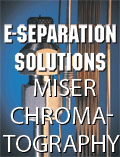PNNL Patents an Updated Ion Funnel
The United States Patent and Trademark Office has issued a patent to Battelle, (Columbus, OH) (Number 15815), which manages Pacific Northwest National Laboratory (Richland, Washington) (PNNL), for an improvement upon their patented ion funnel technology.
The United States Patent and Trademark Office has issued a patent to Battelle, (Columbus, OH) (Number 15815), which manages Pacific Northwest National Laboratory (Richland, Washington) (PNNL), for an improvement upon their patented ion funnel technology. The device, invented by Mikhail E. Belov, provides a high-charge capacity trap, and has been demonstrated to increase sensitivity by an order of magnitude (10x) when compared to continuous operation mode.
The technology also has been shown to result in efficient removal of singly charged ions by controlling the ion ejection times; thus, the signal-to-noise ratio for measurement of multiply charged species is increased. The high sensitivity and efficient trapping capability of the ion funnel trap has led to its application in several emerging PNNL instrument systems, including the multidimensional analytical platform based on integrated liquid chromatography/time-of-flight mass spectrometry and a high-sensitivity triple quadrupole system.
Researchers at PNNL, a U.S. Department of Energy laboratory, have fully implemented the ion funnel trap in mass spectrometry systems at the Environmental Molecular Sciences Laboratory on the PNNL campus.
Maximizing Cannabinoid Separation for Potency Testing with LC
April 7th 2025Researchers from the Department of Chemistry at Western Illinois University (Macomb, Illinois) conducted a study to optimize the separation of 18 cannabinoids for potency testing of hemp-based products, using liquid chromatography with a diode array detector (LC–DAD). As part of our monthlong series of articles pertaining to National Cannabis Awareness Month, LCGC International spoke to Liguo Song, the corresponding author of the paper stemming from this research, to discuss the study and its findings.
How Many Repetitions Do I Need? Caught Between Sound Statistics and Chromatographic Practice
April 7th 2025In chromatographic analysis, the number of repeated measurements is often limited due to time, cost, and sample availability constraints. It is therefore not uncommon for chromatographers to do a single measurement.







